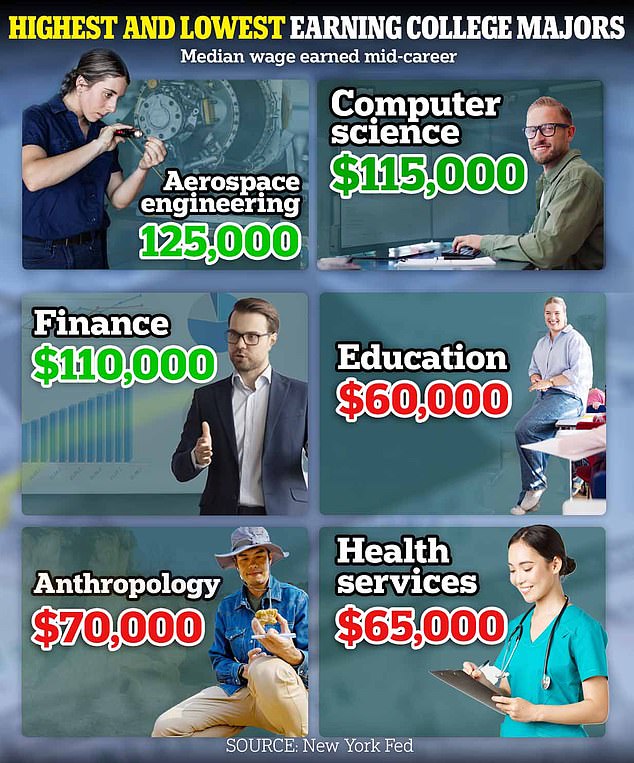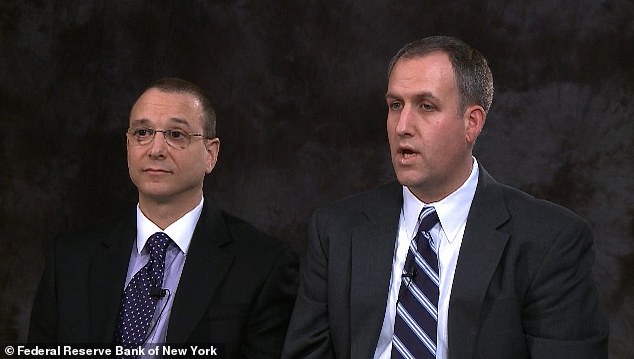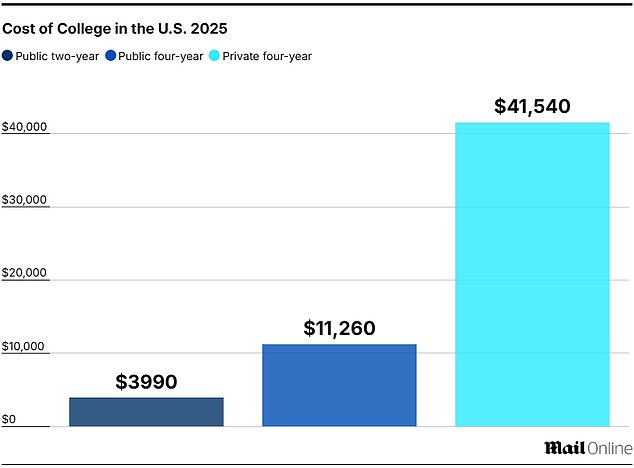Is a College Degree Worth the Money? When It Pays Off and When It Doesn’t
-
EXPLORE FURTHER: The top and bottom college majors for earnings after half a decade
The
The cost of a college education in the US keeps rising steadily.
Therefore, it’s hardly surprising that numerous high school students are questioning whether it remains worthwhile.
University tuition costs and living expenditures are increasing at a quicker pace than the rise in financial assistance.
Approximately 40 million Americans bear $1.6 trillion in student loans, with the majority of them being indebted.
no longer receiving an extension on repayment periods.
Parents now cover an average of 48 percent of the cost of college, up from 38 percent just a decade ago, according to JPMorgan analysis.
Now, a new
study
The Federal Reserve Bank of New York has investigated scenarios where attending college proves beneficial and situations where it does not.
‘Majors providing technical training — that is, quantitative and analytical skills — earn the highest return, including engineering, math and computers,’ the report found.
The highest earning degrees are
virtually all within the field of engineering
.
Aerospace engineering alumni make a midpoint salary of $125,000 during their mid-career stage.
based on research conducted by the Federal Reserve
.

Computer science is also lucrative, with a median wage of $115,000 by the same point.
Conversely, fields with lower earning potential – and thus might appear less worthwhile from an investment standpoint – encompass education, where graduates typically secure a median income of $60,000, and anthropology, wherein professionals achieve a midpoint earnings figure of $70,000 mid-career.
The typical earnings for those in middle careers who have graduated with degrees in education or theology in America amount to $60,000.
Individuals who majored in health services can anticipate an earnings figure of around $65,000 midway through their careers. In contrast, graduates with a focus on fine arts may look forward to a typical income of about $70,000 at the same stage, as per recent statistics from February 2025.
As expenses increase and questions grow regarding the value of that investment, a declining number of students complete their degrees.
For the third consecutive year, the number of graduates holding either a bachelor’s or an associate degree decreased in 2023-24, as reported by the National Student Clearinghouse.
However, the New York Fed discovered that college remains a worthwhile investment for the majority of students.
According to researchers Jason Abel and Richard Deitz, the annual return on investment for a typical college graduate’s education is approximately 12.5 percent.

The economists discovered that this figure ‘significantly surpasses the benchmark for a solid investment.’
In contrast, the stock market provides an average annual return of approximately 8 percent over the long term.
The research team discovered that ‘even a comparatively expensive college education generally provides a substantial benefit for the average graduate.’
The research revealed that college graduates receive a significant pay advantage in the job market relative to individuals holding just a high school diploma, and this earnings gap typically widens as their careers progress.
It is most worthwhile for
fields of study that result in the most lucrative careers
as indicated by the findings.
The typical college graduate holding a bachelor’s degree makes approximately $80,000 annually, whereas someone with just a high school diploma has a median earnings figure of $47,000.
Over a lifetime of work that wage premium well outstrips the costs of forking out for a degree, the researchers found.


Nevertheless, approximately one-quarter of students do not find the investment worthwhile, as stated in the report published last month.
Elements such as the duration dedicated to studies and consequently higher tuition costs, along with earning below the average for graduates, may also be factors.
The researchers found that for the bottom quarter of college graduate earners there was ‘very little difference’ in the wages earned than their peers with just a high school diploma.
‘We estimate a 2.6 percent rate of return for the 25th percentile of college graduates in 2024, making college a questionable investment for this group,’ they explained.